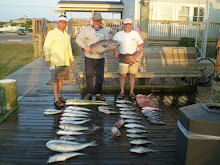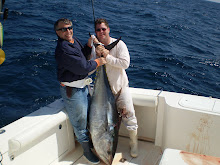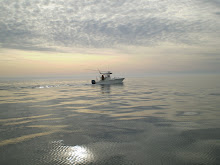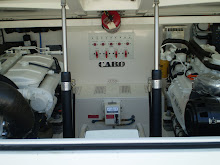
By Jim Field
I had not read this before in print, but this article from today's NYTimes makes mention of the fact that fishermen are already thinking ahead to what the oil spill could do to future tuna populations. If the future wasn't already grim for the over-harvested bluefin species, they're also unfortunate for being wired to spawn in the warm waters of the Gulf of Mexico, which are now being ruined.
The article has lots of facts on seafood, catches, etc. A good quick read.

(Accompanying Photograph)
NEW ENGLAND
Far Away, Fishermen Watch:
‘If It Was Us, That Would Be It’
CHATHAM, Mass. — The fishermen unloading thousands of pounds of cod from weathered boats Thursday in Chatham, Mass., appeared untouched by the crisis in the Gulf of Mexico; it was business as usual, and some predicted it would stay that way.
“We won’t feel it,” Peter Taylor, a native of Cape Cod who has spent his life fishing its waters, said as seals hungrily circled his boat at the Chatham Fish Pier. “The only long-term outcome is there’ll never be any drilling up here on Georges Bank.”
But others suspect the spill might affect their livelihood, for worse or even for better. It depends partly on whether the spill kills the hatchlings of bluefin tuna, a prized New England catch that spawns in the gulf before migrating to Cape Cod.
“That’s first and foremost on everyone’s minds,” said Rick Thompson, who was packing the day’s catch in ice for shipment to markets and restaurants, “but that’s not going to be felt right away — probably down the road.”
Some are also wondering whether, in the shorter term, a shortage of seafood from the gulf might increase demand — and prices — for their own catch.
“If markets open up for ground fish to be shipped down there,” said Neil Kelly, operations manager at the Nantucket Fish Company, a wholesaler, “that would be great for the guys around here.”
Mr. Kelly’s boss, Andy Baler, said typical New England species like haddock, pollock and cod were not popular in the South, so people there would not be likely to turn to New England for replacement fish.
“It’s hard to change appetites,” he said, “but we’ll keep working on it.”
The one exception could be oysters, Mr. Baler said, adding that the cold-water varieties are far more expensive than those caught in the gulf.
“We’ll probably start seeing calls from down South,” he said. “We’ll probably see a little jump in price there.”
So far, Mr. Baler said, the biggest impact on Cape Cod fishermen has been the stress of imagining what would happen if they ever had a similar spill.
“The main effect is all of us losing sleep at night,” he said, “thinking about what’s happened down there. If it was us, that would be it — we’d be done as an industry. We’d fold.”
Still, New England fishermen are facing a legion of problems themselves, from depleted fish stocks to what they consider overly burdensome regulations governing when, where and how much they can fish. Those obstacles feel far more threatening than an oil spill more than a thousand miles away, Mr. Taylor said.
“If the oil companies had the kind of government oversight that the fishing industry has to deal with,” he said, “there would never have been a spill.”
—ABBY GOODNOUGH









No comments:
Post a Comment